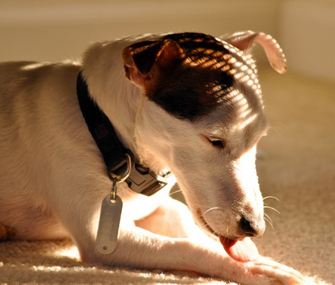
For the scientists to see if dog saliva really does have a significant effect they would have to make sure the subjects wound is licked everyday. The enzymes in dog saliva help destroy the cell walls of dangerous bacteria.

Licking wounds is an intuitive behavior done by animal.
Does dog licking wounds help. Yes a dog licking a wound can help it heal faster. This is because dog saliva actually contains substances that prevent the growth of bacteria. This can be very beneficial in an open wound that is at risk of collecting bacteria.
Licking wounds is an intuitive behavior done by animal. It is common for us to see cat or dog licking their wounds. Not only animal human sometimes also have this kind of habit.
Unconsciously we bite or lick on our small wound especially those small wounds around the fingers. Well for some people licking wounds might be a nasty thing to do. The same applies to wound licking before the rise of modern medicine it was the best tool nature could provide to help your dog heal its wounds.
These days cleaning the wound with an antiseptic solution and then leaving it alone to heal is the far superior course of action. How To Stop A Dog Licking Its Wound With Without Use Of A Collar. To try and help those of you who have found this frustrating we have pulled together a list of a few different ways that you can stop your dog from licking their wounds and as well as the pros and cons associated with each.
Every veterinarian knows that animal patients are driven to lick wounds. We have all seen the destructive force it can be in surgical wound healing. I can recognize a wound that has been licked the instant I see it.
Not only does licking potentially introduce infection but the act of licking can break down tissues and suture. Many people still feel that as a natural response of a dog to a. Licking wounds seems an instinctual reaction to the injury.
Nobody instructs a child to suck a burned finger and nobody teaches a dog to lick a cut paw. But instinct can be biologically based and often serves a purpose. When a dog licks a wound–or a newborn puppy–it cleans it in much the same way you might clean a counter with a sponge.
Dog saliva is often used on various wounds. The dog will instinctively lick his wounds attempting to relive the pain. The saliva will form a film of coolness on top of the wound numbing the area and reducing the pain.
Furthermore licking smaller wounds and injuries also debrides the wound removes damaged dead or infected tissue from the affected area and effectively decontaminates the specific region. Potential risks of licking wounds Licking wounds may have some benefits that promote healing but the practice also comes with a few risks. Itching scratching biting chewing.
Some days your dog appears miserable as he digs at his feet chews on his legs or scratches endlessly at his ears. Excessive licking can be an itchy habit-forming problem but there is relief. Learning the causes behind excessive licking and using four great methods to stop it.
Depending on the wound your dogs licking can be positive or negative. Canine saliva can be helpful in cleaning your wound and even healing it. It is said that their saliva may have antimicrobial and healing properties.
Yet it may be important to not let your dog go too crazy with licking away at your wounds. In reality these wounds wouldnt just heal over night. For the scientists to see if dog saliva really does have a significant effect they would have to make sure the subjects wound is licked everyday.
Then they would have to compare it to the healing process of a wound that is healing naturally. When you think about it if dogs saliva. Licking your own wound or letting your pet do it for you shouldnt cause disease but it does come with risks.
In most cases the safest thing to do with your mouth is to ask for help. Unfortunately licking can reopen the wound and lead to infection. A cone or collar is the traditional way to keep a dog from licking a wound.
You can also try covering the wound with a sleeve or strong bandage. In combination with these techniques engage your dogs attention to keep its mind off the wound as much as possible while it heals. How to Stop Your Dog From Wound-Licking.
It can sometimes be difficult to stop your dog from licking her wounds excessively but there are a few techniques and products that can help. Also called an E-collar the Elizabethan collar is a large plastic cone that fits around your dogs head and neck. Its safer than letting a human do it.
Dogs tend to harbor fewer diseases that are communicable to humans and the actual risk of infection is fairly low. As a kid I let my dog lick scrapes and cuts all the time. Its not going to help anything t.
The benefits of moderate wound licking. The enzymes in dog saliva help destroy the cell walls of dangerous bacteria. Lactoferrin and other antibacterial and anti-viral compounds can also be found in saliva.
Licking a wound delivers protease inhibitors.